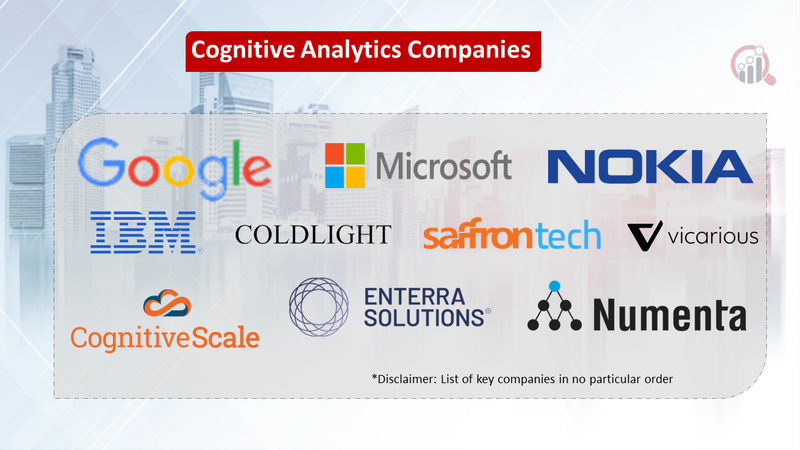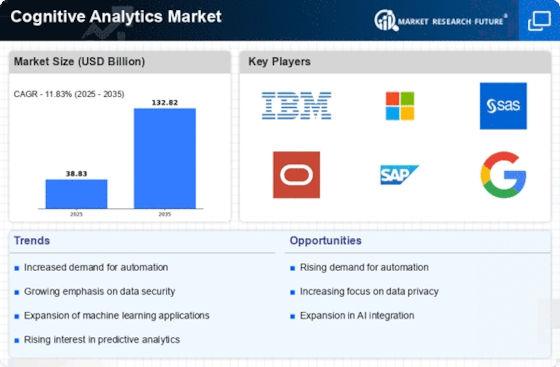Top Industry Leaders in the Cognitive Analytics Market

Competitive Landscape of Cognitive Analytics Market:
The Cognitive Analytics market has witnessed substantial growth in recent years, driven by the increasing demand for data-driven insights and the integration of artificial intelligence (AI) technologies in business processes. As organizations strive to enhance decision-making capabilities and gain a competitive edge, the adoption of cognitive analytics solutions has become pivotal. The market is characterized by the presence of key players, each employing distinct strategies to solidify their positions.
Key Players:
- Google, Inc. (U.S.)
- Microsoft Corporation (U.S.)
- Nokia Networks (Finland)
- IBM Corporation (U.S.)
- ColdLight Solutions (U.S.)
- Saffron Technology (U.S.)
- CognitiveScale (U.S.)
- Enterra Solutions LLC (U.S.)
- Numenta (U.S.)
- Vicarious (U.S.)
Strategies Adopted:
- Product Innovation: Key players have consistently invested in research and development to enhance their cognitive analytics offerings, introducing new features and functionalities to meet evolving market demands.
- Strategic Partnerships: Collaborations with technology partners and industry leaders have been a common strategy to broaden market reach and offer comprehensive solutions to clients.
- Acquisitions: Mergers and acquisitions have played a significant role in market consolidation, as companies seek to strengthen their portfolios and integrate complementary technologies.
Factors for Market Share Analysis:
- Technological Advancements: Companies investing in cutting-edge technologies and staying ahead in the innovation curve tend to capture a larger market share.
- Global Presence: The ability to provide cognitive analytics solutions on a global scale contributes to market dominance, as organizations seek standardized solutions across their operations.
- Customer Satisfaction: High levels of customer satisfaction through effective implementation and support services contribute to market share growth.
New and Emerging Companies:
While established players dominate the cognitive analytics market, several new and emerging companies have entered the arena, introducing innovative solutions and disrupting traditional market dynamics. These companies include:
- DataRobot: Focused on automated machine learning, DataRobot has gained traction for its user-friendly platform, attracting organizations looking to streamline their machine learning processes.
- Alteryx: Specializing in data blending and advanced analytics, Alteryx has carved a niche for itself, catering to businesses seeking simplified analytics workflows.
Current Company Investment Trends:
- Cloud-based Solutions: Companies are increasingly investing in cloud-based cognitive analytics solutions to provide scalability, flexibility, and ease of implementation.
- Industry-Specific Solutions: Tailoring cognitive analytics solutions to specific industries, such as healthcare, finance, and retail, has become a trend to address sector-specific challenges.
- Focus on Explainable AI: With the growing importance of ethical AI, companies are investing in developing cognitive analytics solutions with transparent and explainable algorithms.
Latest Company Updates:
November 2023: Investment Boom - Leading tech companies like IBM, Microsoft, and Google are pouring significant investments into cognitive analytics technologies, fueling product innovation and market expansion.
October 2023: Industry Adoption - Cognitive analytics is gaining traction across various industries, including healthcare, finance, retail, and manufacturing, with applications in areas like customer service, fraud detection, predictive maintenance, and personalized marketing.
December 2023: AI Advancements - Continued advancements in natural language processing (NLP), computer vision, and machine learning are driving the capabilities of cognitive analytics platforms, making them more accurate, efficient, and versatile.
November 2023: Edge Computing - The rise of edge computing is enabling real-time cognitive analytics at the point of data generation, offering faster insights and improved decision-making.
October 2023: Explainable AI - The growing focus on explainable AI (XAI) is increasing transparency and trust in cognitive analytics solutions, addressing concerns about bias and black-box algorithms.
September 2023: Data Privacy and Security: Data privacy and security remain key challenges, requiring robust solutions to ensure responsible AI development and user trust.
August 2023: Talent Shortage: The lack of skilled professionals in cognitive analytics is a potential bottleneck, demanding increased training and education initiatives.
July 2023: Ethical Considerations: Ethical considerations around bias, fairness, and job displacement need to be addressed to ensure responsible and sustainable use of cognitive analytics.










